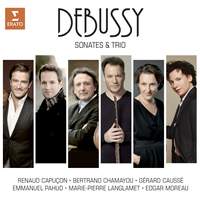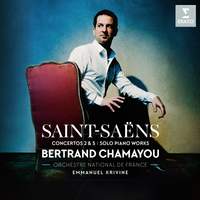Recording of the Week,
Saint-Saëns from Renaud Capuçon, Edgar Moreau and Bertrand Chamayou
2021 marks the centenary of Saint-Saëns’s death, and today brings an early commemoration from a trio of French musicians whose tribute to Debussy in similar circumstances three years ago was one of the most compelling contributions to the anniversary: Bertrand Chamayou, Edgar Moreau and Renaud Capuçon won a BBC Music Magazine Award for their recording of the latter composer’s Violin Sonata, Cello Sonata and Piano Trio in 2018, and these lucid, affectionate accounts of works in the same genres by his older contemporary share many of the same virtues as that earlier project.
Chief among these is the crystalline, ever-responsive pianism of Chamayou, whose affinity with Saint-Saëns’s writing (and enthusiasm for championing lesser-known corners of the composer’s output) is a known quantity: his interpretations of the Second and Fifth Piano Concertos and a selection of rather more neglected solo works was Gramophone’s Recording of the Year in 2018, and the ‘exemplary clarity’ which so impressed the jury on that occasion are everywhere in evidence here. (The precision and facility of his playing is all the more remarkable given that the new recording was made shortly after an enforced sabbatical from the keyboard: as he recounted in our recent interview about his solo album Good Night!, he spent two months without access to an instrument this spring due to lockdown restrictions, but by the time these sessions came around in July he was evidently back in peak condition!).
 The recital opens with a luminous account of the Violin Sonata No. 1 from 1885, a work which enchanted and inspired no less a figure than Marcel Proust, but which has never gained the same foothold in the repertoire as the César Franck sonata from the following year. Listening to Capuçon and Chamayou it’s difficult to see why we don’t hear it rather more often, given its wealth of memorable melodies and the imaginative interplay between the two instruments: in particular, there are some wonderful moments when the violin steps away from the spotlight to sustain singing high notes over the intricate piano filigree, and the way Capuçon shapes and colours these ‘pedals’ (all three works here draw on the composer’s predilection for the organ in one way or another) is a miniature masterclass in chamber-playing in itself. The relative leanness of his tone – and both artists’ avoidance of the ‘sentimentality’ which Debussy so reviled in Saint-Saëns’s music – rather put me in mind of the cool sensuality which Alina Ibragimova and Cédric Tiberghien brought to the Franck sonata last year, and their absolute synergy in the finale’s gleeful moto perpetuo is a scintillating delight.
The recital opens with a luminous account of the Violin Sonata No. 1 from 1885, a work which enchanted and inspired no less a figure than Marcel Proust, but which has never gained the same foothold in the repertoire as the César Franck sonata from the following year. Listening to Capuçon and Chamayou it’s difficult to see why we don’t hear it rather more often, given its wealth of memorable melodies and the imaginative interplay between the two instruments: in particular, there are some wonderful moments when the violin steps away from the spotlight to sustain singing high notes over the intricate piano filigree, and the way Capuçon shapes and colours these ‘pedals’ (all three works here draw on the composer’s predilection for the organ in one way or another) is a miniature masterclass in chamber-playing in itself. The relative leanness of his tone – and both artists’ avoidance of the ‘sentimentality’ which Debussy so reviled in Saint-Saëns’s music – rather put me in mind of the cool sensuality which Alina Ibragimova and Cédric Tiberghien brought to the Franck sonata last year, and their absolute synergy in the finale’s gleeful moto perpetuo is a scintillating delight.
Leanness is Edgar Moreau’s watchword, too, in the rather more austere Cello Sonata No. 1 which Saint-Saëns composed thirteen years earlier during a particularly dark period in his personal life; if Chamayou spent much of his recent album of lullabies exploring the upper register of the keyboard, Moreau is required to conjure just as many colours from the extreme lower reaches of his instrument here, and rises to the challenge superbly. Textures which could easily become muddy in lesser hands are illuminated with a lovely sepia glow, and whilst neither performer shies away from the inherent rawness of much of the writing the sound never becomes unduly harsh or guttural. The near-symphonic finale is perhaps the stand-out track on the album for me, with Moreau tapping into those organ-like sonorities of which the composer was so fond to imposing effect.
After the relative restraint of the two sonatas, all three artists summon a rather more expansive sound for the 1892 Piano Trio, especially in the lovely G major episode of the first movement which yields little to the finale of the Franck sonata when it comes to relaxed, open-hearted charm. The second movement’s louche, almost jazzy exchanges (interspersed with more crystal-clear, quasi-Classical passage-work from Chamayou) also come off beautifully, and the cleanness of Capuçon and Moreau’s tone once again pays dividends in the finale where the profusion of octaves are executed with easy flair and not so much as a hint of curdled intonation.
It’s early days, but the French triumvirate should probably clear some space on their collective mantelpiece come awards season: this is surely another winner.
Renaud Capuçon (violin), Edgar Moreau (cello), Bertrand Chamayou (piano)
Available Formats: CD, MP3, FLAC, Hi-Res FLAC, Hi-Res+ FLAC
Related recordings
Renaud Capuçon (violin), Bertrand Chamayou (piano), Edgar Moreau (cello), Emmanuel Pahud (flute), Gerard Caussé (viola), Marie-Pierre Langlamet (harp)
Available Formats: CD, MP3, FLAC, Hi-Res FLAC
Bertrand Chamayou (piano), Orchestre National de France, Emmanuel Krivine
Available Formats: CD, MP3, FLAC, Hi-Res FLAC





